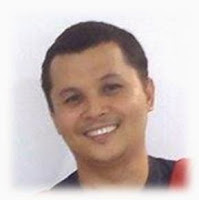Misyon Online - July-August 2015



PULONG NG EDITOR
Fr Kevin O’Neill, the Superior General of the Missionary Society of St Columban, welcomed LAUDATO SI’, the encyclical of Pope Francis ‘On Care for our Common Home, with these words: ‘We thank Pope Francis for his visionary and pastoral leadership which invites us as faithful disciples of Jesus to an on-going ecological conversion. Our lived experience speaks to us as we see the impacts of the exploited Earth and exploited peoples. We believe, as stated in our 2012 General Assembly, ‘that we are called to solidarity with marginalized people and the exploited Earth [which] are ways we participate in God’s mission’.’

WHAT IS IT TO BE A COLUMBAN LAY MISSIONARY?
By Arlenne B. Villahermosa
CLM Arlenne Villahermosa in Myanmar
The author, who is currently the Coordinator of Columban Lay Missionaries – Philippines, has worked as a lay missionary in Korea and Myanmar. She is from Talisay City, Cebu. At their annual meeting last year the Columban Lay Missionaries in the Philippines reflected on these three questions.
- What was it like to leave my family, culture, and country for the first time?
- What about my coming to a ‘new land?’
- As I respond to this calling of being a Columban lay missionary through my ministries, how has this calling been deepened over time?
My Vocation StoryBy Michael Javier
When I was a child I liked to be involved in religious activities in our barangay, maybe because I saw that my grandparents were very active in the church. Some people and even priests asked me at times if I wanted to become a priest someday. My response was usually just a smile. When I went to Cebu City for my college studies I joined and became an active member of Singles for Christ (SFC). I thought that that would be enough for me in serving my brothers and sisters in Christ but when I left Cebu and went to Taiwan to work, my faith and sense of service in the Church became stronger. I volunteered in the church. There were religious sisters working in the same parish who noticed my presence and asked if I wanted to become a priest. I told them that I was discerning. So they recommended a spiritual director to talk to and who could guide me in my discernment. |
||||
|
||||
|
|
||||
Spreading Happiness through Sign Language
By Richelle H. Verdeprado
The author, a social worker by profession was, until recently, the Editorial Assistant of MISYONonline.com. She is now teaching full-time at the University of Negros Occidental – Recoletos (UNO-R) in Bacolod City.
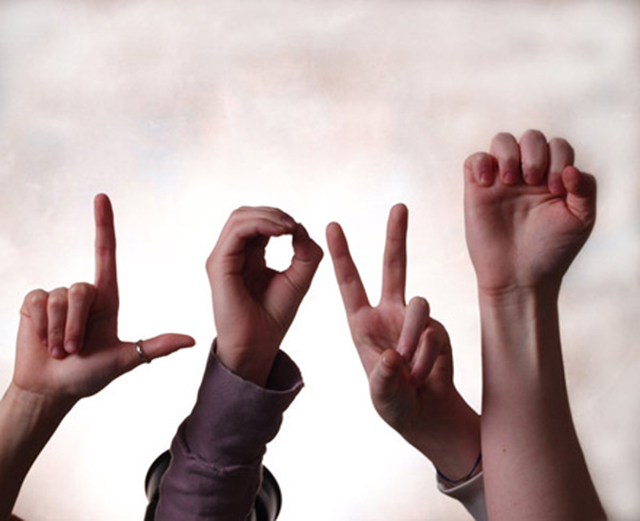
Your first glance at this young woman from Cagayan de Oro City named Marice would make you remember her curly hair and smiling eyes. But when you would see her use her hands to communicate with the Deaf you would then remember her as someone whose ears and heart are always embracing the Deaf, especially children. You would think of her as a selfless and dedicated volunteer.

A Concert in Hong Kong for Anniversary Year of St Columban
By Fr Patrick Colgan
The author, from Northern Ireland, is a member of the General Council of the Missionary Society of St Columban in Hong Kong. He has worked in Fiji for many years.

On 11 June this year a quite historic confluence of ‘worlds’ came together: the Oriental and the Celtic, diplomats and business people, missionaries and music lovers, as the Anglican Cathedral Church of St John in Hong Kong quieted for ‘The Journey – a Celebration of the Life of St Columban’, an Irish monk-missionary who died exactly 1400 years ago, patron of the Columban missionaries.

OUR HIDEAWAY
What I have Learned from Being Vulnerable
By Red Dawn Laurente
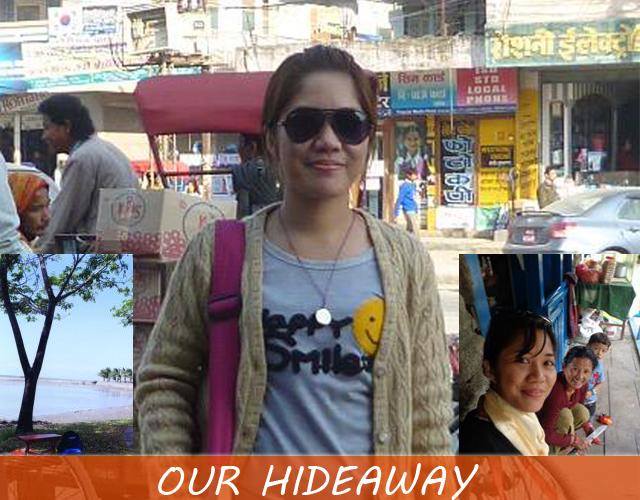
‘Is it meant to be?’ I asked myself hoping I could get an answer as to why I ended up in a situation where I felt so helpless, weak, isolated and incapable.
What I found was a very profound answer.
April 25 this year started as an ordinary morning. I was sitting in front of my computer in a laid-back way, passing the time, when suddenly the earth shook in a manner I had never experienced before. I heard a deafening sound followed by screams of people nearby. I knew that something big was happening but because of my shock and utter confusion I didn’t know what to do. Then I saw debris falling from the ceiling and thought that maybe my end was near. Being scared, I escaped from my room. In the hallway of my apartment building I met my neighbor and saw his very scared eyes. I knew it wasn’t just an ordinary tremor but an earthquake of great intensity. I tried to run out of the building as fast as I could.

July – August 2015
In the Highlands of Scotland
Father, we praise you with all your creatures.
They came forth from your all-powerful hand;
they are yours, filled with your presence and your tender love.
Praise be to you!
Son of God, Jesus,
through you all things were made.
You were formed in the womb of Mary our Mother,
you became part of this earth,
and you gazed upon this world with human eyes.

Pulong ng Editor
Fr Kevin O’Neill, the Superior General of the Missionary Society of St Columban, welcomed LAUDATO SI’, the encyclical of Pope Francis ‘On Care for our Common Home, with these words: ‘We thank Pope Francis for his visionary and pastoral leadership which invites us as faithful disciples of Jesus to an on-going ecological conversion. Our lived experience speaks to us as we see the impacts of the exploited Earth and exploited peoples. We believe, as stated in our 2012 General Assembly, ‘that we are called to solidarity with marginalized people and the exploited Earth [which] are ways we participate in God’s mission’.’
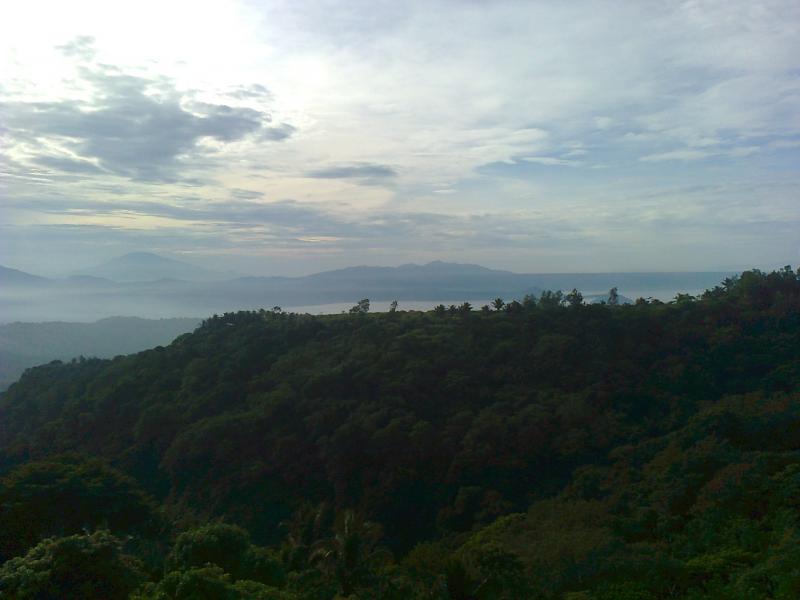
Tagaytay, Philippines
We read in Mark 1: 14-15, ‘Now after John was arrested, Jesus came to Galilee, proclaiming the good news of God, and saying, “The time is fulfilled, and the kingdom of God has come near; repent, and believe in the good news.” ‘In other words, Jesus calls us to conversion at the very beginning of his public ministry.
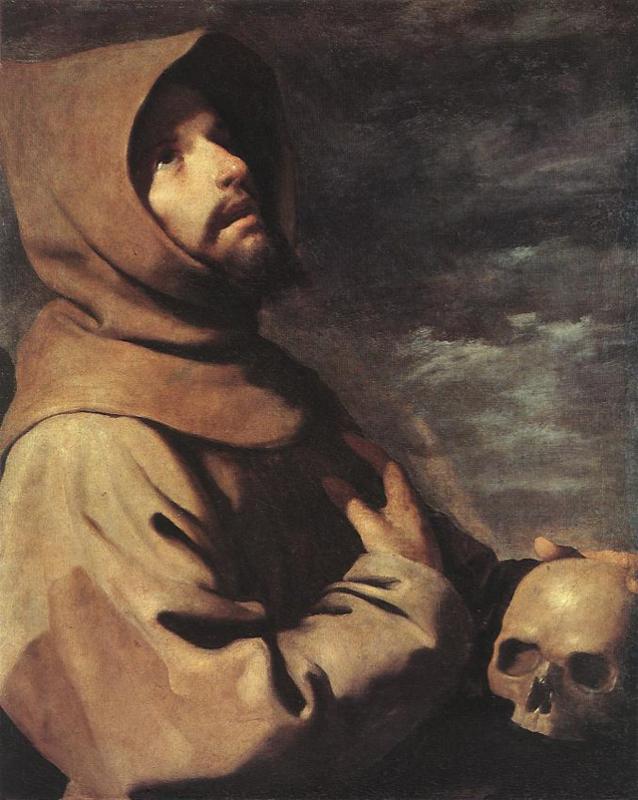
St Francis, Francisco de Zurbarán, c.1660
Alte Pinakothek, Munich [Web Gallery of Art]
Pope Francis finds great inspiration in the life of the man ‘whose name I took as my guide and inspiration when I was elected Bishop of Rome’, St Francis of Assisi. He writes in No 10: ‘I believe that Saint Francis is the example par excellence of care for the vulnerable and of an integral ecology lived out joyfully and authentically. He is the patron saint of all who study and work in the area of ecology, and he is also much loved by non-Christians. He was particularly concerned for God’s creation and for the poor and outcast. He loved, and was deeply loved for his joy, his generous self-giving, his openheartedness. He was a mystic and a pilgrim who lived in simplicity and in wonderful harmony with God, with others, with nature and with himself. He shows us just how inseparable the bond is between concern for nature, justice for the poor, commitment to society, and interior peace.’ All of this speaks of conversion.

The Blue Marble [Wikipedia]
Photo of earth by crew of Apollo 17, 7 December 1972
And part of conversion is accepting responsibility that comes from the demands of our faith: ‘If the simple fact of being human moves people to care for the environment of which they are a part, Christians in their turn “realize that their responsibility within creation, and their duty towards nature and the Creator, are an essential part of their faith”’ (No 64).

Ballachulish, Scotland
In No 120 the Pope touches on one of the greatest evils in today’s world: ‘Since everything is interrelated, concern for the protection of nature is also incompatible with the justification of abortion. How can we genuinely teach the importance of concern for other vulnerable beings, however troublesome or inconvenient they may be, if we fail to protect a human embryo, even when its presence is uncomfortable and creates difficulties? “If personal and social sensitivity towards the acceptance of the new life is lost, then other forms of acceptance that are valuable for society also wither away”.’
No 117 says very forcefully, ‘Neglecting to monitor the harm done to nature and the environmental impact of our decisions is only the most striking sign of a disregard for the message contained in the structures of nature itself. When we fail to acknowledge as part of reality the worth of a poor person, a human embryo, a person with disabilities – to offer just a few examples – it becomes difficult to hear the cry of nature itself; everything is connected. Once the human being declares independence from reality and behaves with absolute dominion, the very foundations of our life begin to crumble, for “instead of carrying out his role as a cooperator with God in the work of creation, man sets himself up in place of God and thus ends up provoking a rebellion on the part of nature.”’
The Bishop of Rome writes in No 230: ‘Saint Therese of Lisieux invites us to practise the little way of love, not to miss out on a kind word, a smile or any small gesture which sows peace and friendship. An integral ecology is also made up of simple daily gestures which break with the logic of violence, exploitation and selfishness. In the end, a world of exacerbated consumption is at the same time a world which mistreats life in all its forms.’

Head of a Peasant Woman with White Cap, Van Gogh, March 1885
Kunstmuseum, Berne, Switzerland [Web Gallery of Art]
‘There is a mystical meaning to be found. . . in a poor person’s face’
The successor of St Peter writes beautifully in No 233: ‘The universe unfolds in God, who fills it completely. Hence, there is a mystical meaning to be found in a leaf, in a mountain trail, in a dewdrop, in a poor person’s face.’
He reminds us of the importance of Sunday Mass: ‘On Sunday, our participation in the Eucharist has special importance. Sunday, like the Jewish Sabbath, is meant to be a day which heals our relationships with God, with ourselves, with others and with the world. Sunday is the day of the Resurrection, the “first day” of the new creation, whose first fruits are the Lord’s risen humanity, the pledge of the final transfiguration of all created reality. It also proclaims “man’s eternal rest in God”’ (No 237).
Your editor has only yet dipped into LAUDATO SI’. It is a document that is meant to be read slowly, reflectively and prayerfully, a document ‘which is now added to the body of the Church’s social teaching’ (No 15) and therefore to be understood as God guiding us through his Church. It is an interpretation of the Gospel in the context not only of the world of today but of the world of tomorrow that we will bequeath on those who come after us.
It is a document that asks us to do what Jesus asked at the beginning of his public ministry: ‘ repent, and believe in the good news’.
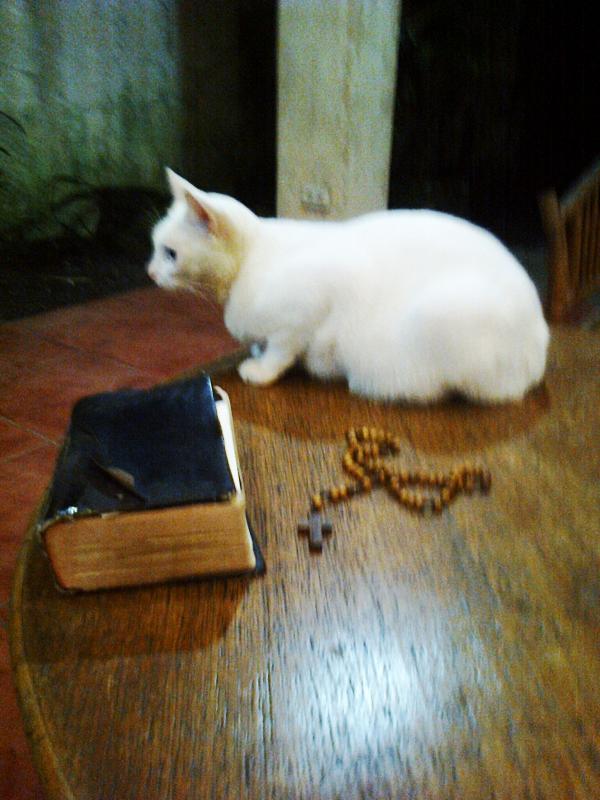
Father, we praise you with all your creatures.
They came forth from your all-powerful hand;
they are yours, filled with your presence and
your tender love.
Praise be to you!
(Pope Francis, LAUDATO SI’, No 246)
A Concert in Hong Kong for Anniversary Year of St Columban
By Fr Patrick Colgan
The author, from Northern Ireland, is a member of the General Council of the Missionary Society of St Columban in Hong Kong. He has worked in Fiji for many years.

On 11 June this year a quite historic confluence of ‘worlds’ came together: the Oriental and the Celtic, diplomats and business people, missionaries and music lovers, as the Anglican Cathedral Church of St John in Hong Kong quieted for ‘The Journey – a Celebration of the Life of St Columban’, an Irish monk-missionary who died exactly 1400 years ago, patron of the Columban missionaries.
The anniversary concert was the fruit of over a year’s collaboration between the Celtic Connections Choir, the International Chamber Orchestra of Hong Kong, the Irish Consulate, St Patrick’s Society and the Irish Chamber of Commerce, the China- and Hong Kong-based Columbans, the Columban Lay Mission Leadership Team and the Columban Sisters' Associates' Group.
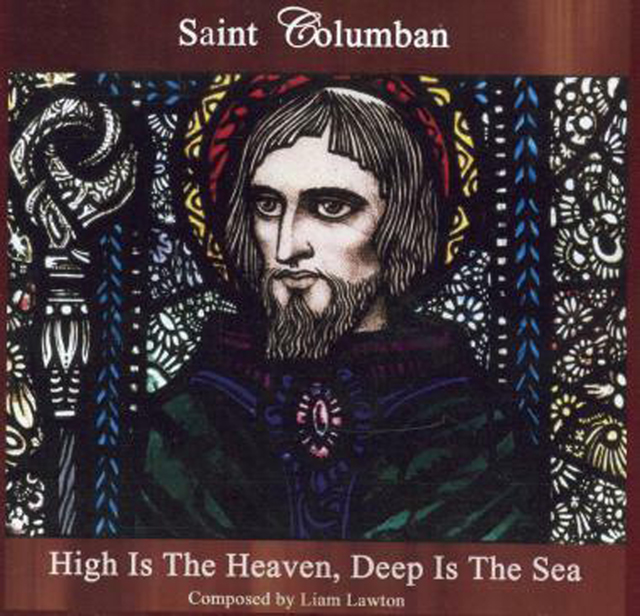
A Portrait of St Columban
It all began with a conversation at the St Patrick’s Day celebration of 2014 in Hong Kong when Fr Tommy Murphy, Superior General of the Missionary Society of St Columban from 2006 till 2012, and I mused with a number of Hong Kong-based Irish business women about the St Columban Anniversary Year ahead. Little did we realize how it would grow into a busy year of events - with many hours of preparation in committees! - culminating in an opening Chinese Banquet in March, this concert in June, a Christian Meditation Retreat in September dedicated to St Columban, the year rounding out with a Mass to be celebrated by Cardinal John Tong, Bishop of Hong Kong, at St Joseph's Church, Hong Kong, on 21 November.
The Irish Consul to Hong Kong and Macau, Mr Peter Ryan, told the congregation at St John’s that the wider Irish and Hong Kong community ‘had only been waiting’ for the Columbans to ask for help to celebrate appropriately this Anniversary year. Peter, having personally come to know many Columbans during stints in Korea, Japan and New York, roundly praised missionaries as being ‘the truest’ ambassadors of their home nations, and icons of hope for many thousands, particularly in Asia. He spoke affectionately of Columban Sr Mary Dillon, who runs an AIDS hospice in Myanmar (and for whom a collection was made during the concert), the famous ‘Fr PJ McGlinchey (and horses!!)’ of Jeju-do, Korea, and many others.
The song High is the Heaven, Deep is the Sea (commissioned for the year and composed by Fr Liam Lawton of the Diocese of Kildare and Leighlin, Ireland) started and became a fitting finale to the concert. But, I feel that if St Columban himself could have talked, he would probably have used the very Irish expressions of another song that night, the 'Gaelic Blessing' of the English composer, John Rutter:
‘Deep peace of the running wave to you,
The flowing air, shining stars, the gentle night to you,
Moon and stars pour their light on you,
Deep peace of Christ, the Light of the World, to you.’
A Gaelic Blessing
High is the Heaven, Deep is the Sea
Chorus. High is the heaven, deep is the sea
Wide is your wisdom that calls us to be
Formed in your Spirit that we might reveal;
Love is your dwelling, love is your dwelling,
O eternal mystery
1. And what of the world that it may reflect
The presence of God, this beauty on earth!
Wise be the soul who longs to respect
The Creation of God from its birth to its death.
2. And what of the time that passes away,
While only God's love for all still remains;
For all things shall pass and all things know change
For we are but Pilgrims, still finding the way
3. And what of our Joy that our hearts should know
(The) harvest of saints, gathered and grown,
The gift to our day from cells hewn in stone;
Columban of God, your name we make known.
4. And what of the day Columban set sail
From Bangor to Britt’ny, then on to Luxeuil;
You rowed up the Rhine, arrived in Bregenz;
T’was in Bobbio where you arrived in peace.
5. And what of the heirs who carry your name,
Your daughter and sons with hearts set aflame;
Christi simus non nostril;
We are for Christ and not for ourselves.
Credits:
Lyrics and music by Liam Lawton
Arranged by Mark Cahill
Stanzas 4 and 5 written by the Columban priests in Malate Parish, Manila
Finale arranged by Cris Añago, Musical Director, Malate Parish.
Performed by The Prague Philharmonic Orchestra
Choir: Voices of Ireland Chamber Choir
You may listen to the original version and read the original text by clicking here.
What is it to be a Columban Lay Missionary?
By Arlenne B. Villahermosa
CLM Arlenne Villahermosa in Myanmar
The author, who is currently the Coordinator of Columban Lay Missionaries – Philippines, has worked as a lay missionary in Korea and Myanmar. She is from Talisay City, Cebu. At their annual meeting last year the Columban Lay Missionaries in the Philippines reflected on these three questions.
- What was it like to leave my family, culture, and country for the first time?
- What about my coming to a ‘new land?’
- As I respond to this calling of being a Columban lay missionary through my ministries, how has this calling been deepened over time?
Family. Relatives. Friends. Relationships. The familiar. A good job. Security. These were the sources of my joy before I joined the Columban Lay Missionaries in 2000 and at the same time the reasons why it was difficult to leave for mission. Ironically, however, these have become the sources of my strength as well and the inspiration to continue. The past has made the present become possible and meaningful.
There was pain but there was also inner peace when I decided to leave for mission. It was difficult to leave my family, love ones and the life I was enjoying but there was a greater force, a peaceful joy that moved me to go with the Missionary Society of St Columban on cross-cultural mission as a lay missionary. The future was unknown and I had no idea what it would be like to live outside the confines of home. But there was a holding space – a space where I could be and allow my family to be, separate yet connected, allowing us more space to spread the love we have had through the years to others. It was time to spread the wings of love and joy to a bigger home. The same God who was with me continues to accompany me in the journey and stays with my family and loved ones wherever they may be.
Arlenne in Korea with an elderly woman
Experiences in Korea and Myanmar have made me realize even more the beauty of my own land, my family, friends and culture. However, these have also opened my eyes to more beauty in the differences between cultures and the diversity of life in the world. Learning three new languages, at different times, was both exciting and frustrating especially when I thought that I had progressed in my pronunciation only to find out that I wasn’t understood. But the kindness and compassion of the people humbled me and taught me to be more patient and forgiving. I don’t have to be perfect to be understood, I only have to love to be able to reach out and language will follow.
Arlenne on Pilgrimage, Mindanao, November 2013
When on mission overseas the temptation to compare different cultures and ways of doing things is strong and can bring more harm than help if not examined and used in a proper context. It took me some time to be able to appreciate ‘the otherness’ of others. But when I did, it felt like home. I was at home. My own family I grew up with taught me what it’s like to be at home. We are different from each other but amidst our differences we live, laugh, cry, argue, enjoy, accept each other and stay together. Mission has taught me that if I can acknowledge and accept the differences in other cultures and live with them in joy then I am at home in a bigger world. I feel one with others. I experience a bigger God and the vastness of His love.
Arlenne in Myanmar, Jubilee Celebration 2010
Thirteen years on mission have taught me that I am but a tiny part of the whole of creation. As Lynn Twist once said, ‘I don’t have a big role or a small role. I only have a role which I have to play.’ I am an extension of God’s love and I continue to be so with the role entrusted to me, as I also allow others to be God’s extension of love to me, to others and the whole
of creation.

My Vocation Story
By Michael Javier
Michael left for Chile in May with the two other members of PH22, Lorna Cañete and Gilda Comayas for a three-year term as Columban Lay Missionaries.
When I was a child I liked to be involved in religious activities in our barangay, maybe because I saw that my grandparents were very active in the church. Some people and even priests asked me at times if I wanted to become a priest someday. My response was usually just a smile.
When I went to Cebu City for my college studies I joined and became an active member of Singles for Christ (SFC). I thought that that would be enough for me in serving my brothers and sisters in Christ but when I left Cebu and went to Taiwan to work, my faith and sense of service in the Church became stronger. I volunteered in the church. There were religious sisters working in the same parish who noticed my presence and asked if I wanted to become a priest. I told them that I was discerning. So they recommended a spiritual director to talk to and who could guide me in my discernment.
We talked and he explained to me that I needed to discern well to see if my calling was to the priesthood, to family life or to be a lay brother. I was very grateful for what he told me because it helped me a lot in my discernment.
In the long time that I was a volunteer in the parish I'd already met some Columban Missionaries but I do not have the time or courage to ask what their works were. All I knew was they were Columban priests. I did not know there were also Columban Lay Missionaries who worked with us in the Church.
Michael and his grandparents
When I learned that Beth Sabado from Pagadian City, Zamboanga del Sur, was one of the Columban Lay Missionaries (CLMs) I found time to ask what their works were and how to apply to become one. When Beth was assigned in Hong Kong, I asked the same question of Joan Yap, from Ipil, Zamboanga Sibugay, and she explained the process. So from that time on my mind told me that I would try to join CLM.
Then I left Taiwan because my contract had been completed and went back to Philippines. I wanted to return to Taiwan but my placement agency did not allow me due to reasons beyond my control. So I decided to work in Bohol as a customer representative for a local brand of wine. But I worked there only one month and a half because I kept thinking that this was not the life I wanted. So I contacted the CLM vocations and they welcomed me in their accompaniment program.
Then I applied and was accepted in the orientation program. During this I learned a lot about mission, social issues and knowing myself more and learned some of the works of the Columban Missionaries. Now I am ready to bring what I learned and my whole self to mission and become a living witness of God's love and mercy.

PH23 - New Team of Columban Lay Missionaries in Orientation
Two young women began their nine-month orientation program as Columban Lay Missionaries in June. Here is a brief profile of each taken from the blog, and edited, of Columban Lay Missionaries – Philippines. ‘PH23’ indicates that they are the 23rd group of Filipino Columban Lay Missionaries. The first 19 groups were named ‘RP1’, ‘RP2’ etc. After that the teams have been known as ‘PH20’ etc.
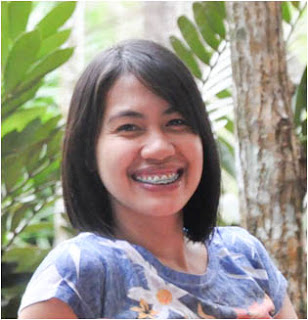
MAREA LYN ALMIRAÑEZ
31 yrs old, Sta Rosa, Laguna
Marea, who is 31 and from Sta Rosa, Laguna, graduated with a BS in Computer Science from San Sebastian College - Recoletos Manila and earned a Masters in Religious Education from Mother of Life Center, Novaliches, Quezon City. She loves to read inspirational books and regards facilitating retreats and recollections as her special skill. Marea, described by her family as responsible and by friends as jolly and caring, worked as a pastoral assistant at San Beda College Alabang, Muntinlupa City. There she met Violeta Villaraiz who had spent three years as a Columban Lay Missionary in Korea and who introduced her to CLM. Marea is the youngest of 7 children.
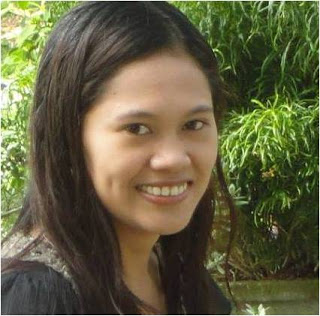
FEBIE GONZALES
27 yrs old, Alamada, Cotabato
Febie is 27 and from Alamada, Cotabato, graduated with a BS in Accounting and Financial Management from Notre Dame University (NDU), Cotabato City. Described by her family as loving and caring and by her friends as humble and compassionate, Febie considers listening and counseling as her special skills. Becoming a missionary has long been a dream of hers and joining CLM is a step towards realizing that dream. She was working full-time at the Cooperative Bank of Cotabato and part-time at Notre Dame Center for Catechesis, situated on the NDU campus, prior to joining CLM. She is the fourth of five children.
|
Our Hideaway
What I Learned from Being Vulnerable
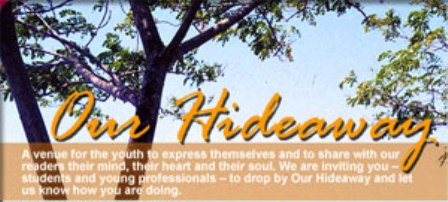
Caught in the 7.9 earthquake in Nepal
By Red Dawn Laurente
‘Is it meant to be?’ I asked myself hoping I could get an answer as to why I ended up in a situation where I felt so helpless, weak, isolated and incapable.
What I found was a very profound answer.
April 25 this year started as an ordinary morning. I was sitting in front of my computer in a laid-back way, passing the time, when suddenly the earth shook in a manner I had never experienced before. I heard a deafening sound followed by screams of people nearby. I knew that something big was happening but because of my shock and utter confusion I didn’t know what to do. Then I saw debris falling from the ceiling and thought that maybe my end was near. Being scared, I escaped from my room. In the hallway of my apartment building I met my neighbor and saw his very scared eyes. I knew it wasn’t just an ordinary tremor but an earthquake of great intensity. I tried to run out of the building as fast as I could.
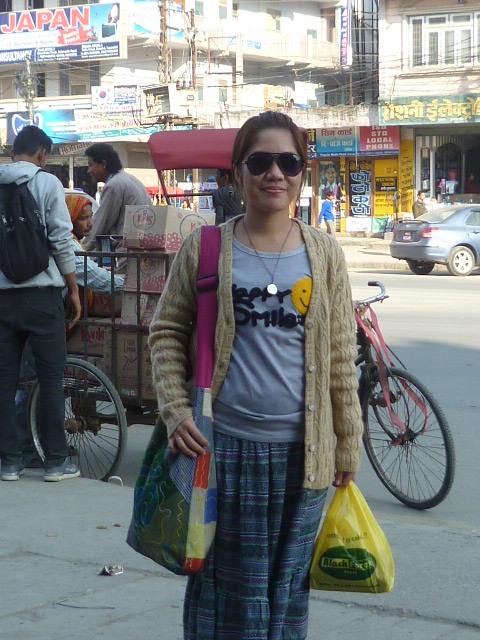
The nature of my work as a volunteer allows me to travel to different
places. This picture was taken near the borders of India.
While I was running the earth was still shaking frantically and I felt a very strong force knocking me to the ground. When I tried to get up I couldn’t walk.. Thankfully my neighbor saw me fall and helped me get out of the building.
At that moment I became crippled and unable to support myself. After the strong and interminable tremors subsided a Nepali friend came to look for me. Seeing my condition she brought me to her home. For several days I was dependent on her family while I was waiting to be rescued. I was very thankful for their generosity.
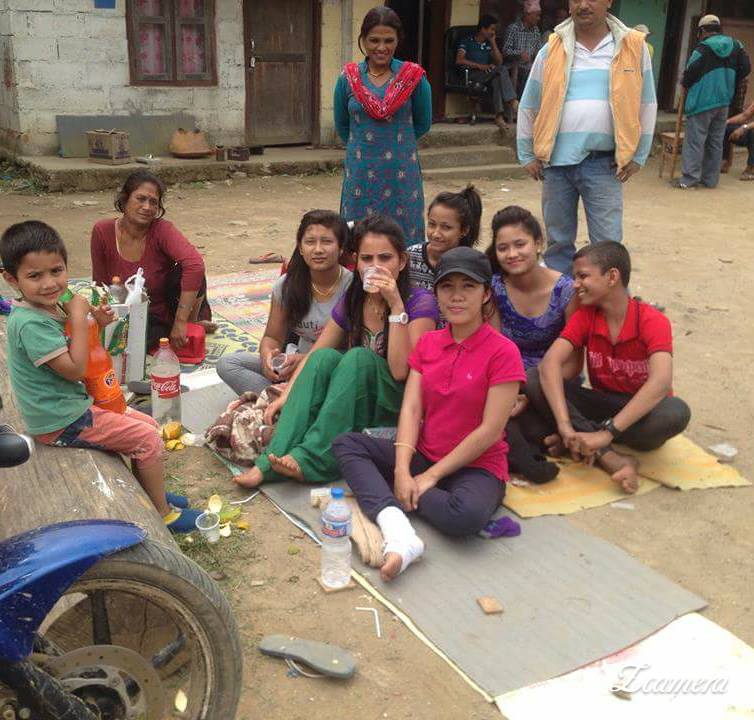
This is the family that gave me refuge.
However, supporting myself in the midst of calamity was physically tiring and exhausting. But the mental and emotional pain was greater than any physical discomfort I was feeling. I saw my neighbors and other victims of the earthquake needing much help and support. But I was aggrieved by the fact that I couldn’t help others because I was also suffering. I asked myself, ‘What’s the use of flying half way around the world and not being able to do anything?’ It was my job to serve, to take care of and support those who were vulnerable and to help them especially in times like this and yet there I was unable to walk. I was an encumbrance.
I had gone to Nepal in August 2014 as a developmental worker in the area of education. I was assigned to Dhading District, one of the country’s 75 districts, to work as teacher trainer in twelve schools for our Sisters for Sisters Project.
I trained and mentored Nepali teachers from grades four to six in child-centered teaching methodologies. I also helped head teachers, school management committees and parent-teacher associations to develop inclusive and gender-sensitive programs.
Before the 7.9 magnitude earthquake I had been living in beautiful Nepal for eight months. I had learnt the culture, was able to speak the Nepali language and I had already made significant bonds of friendship.
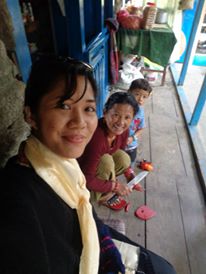
Nepali hospitality is priceless. Taking a picture with my host family while
doing field work.
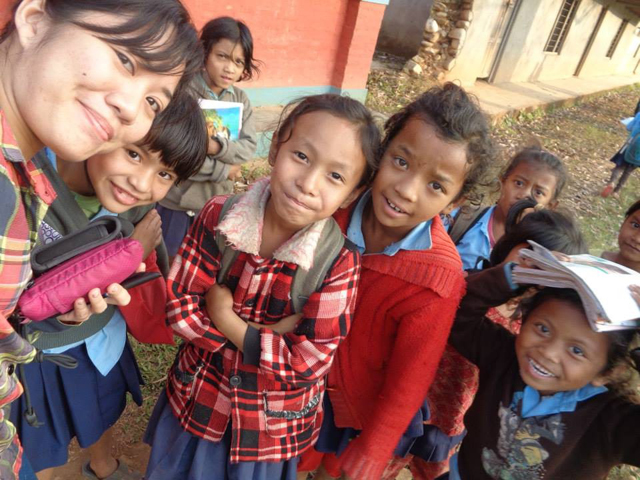
The school kids at one of our schools. There we call them little sisters or
in Nepali we say 'bahini'. Other than tutoring, it is essential that we give
them advices and support like sisters.
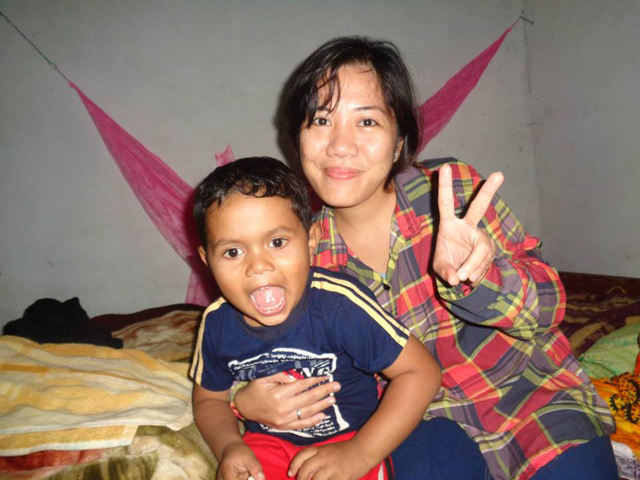
Anukrit the son of one of the teachers I'm working with. In Nepal
relationships are very intimate. My colleagues at work treat me as a family
member.
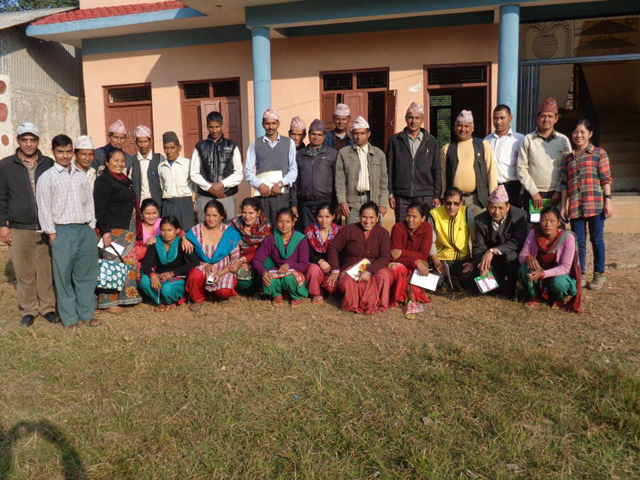
Teachers, school management committee and members of PTA during our school
improvement plan workshop.
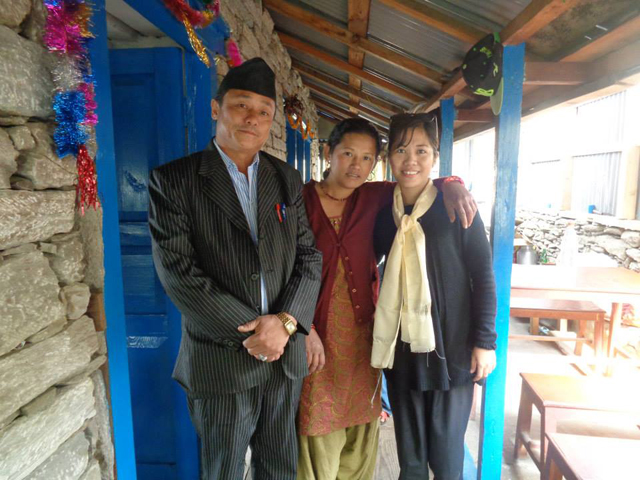
A photo of Sir Jay Gurung together with his family in his house in Baseri.
Usually I have to walk 3-5 hours on steep terrains to reach our schools. I stay
in the house of the teachers for a couple of days when I'm working in schools.
As the days passed, the condition of my foot became worse and so did the emotional discomfort within me. I was extremely worried because I didn’t have means of communication and I couldn’t contact my organization to let them know that I was injured. Also, I couldn’t contact my family and friends back home who must have been worried about me.
I stayed a couple of days and nights at the evacuation area surviving with just the basic necessities.
I grew anxious and I couldn’t accept the situation I was in. With my broken foot I was so helpless. I didn’t want to concede to my disability because by doing so I would appear weak and undependable. And also, I didn’t want to burden my friend and her family so I maintained a strong mask. I had endured many challenges, gone through a number of frustrations and turning points in life. I am a very self-reliant and independent person. I am a volunteer, and I am resilient. It is not like me to appear weak.
But deep inside I was crying for help. My injury had brought me to a situation of extreme vulnerability. Vulnerability is a precarious position, exposed, unprotected and defenseless.
For a short while, I lived under the illusion that I was capable enough of taking care of myself. This prevented me from thinking that I was an encumbrance to the people around me. But eventually I became too exhausted and desolate. Our true nature will enable us to see that it is essential to have support in times like this and that we need to surrender ourselves without reservation.
Being vulnerable gave me a humbling learning experience and a deeper contemplation of what vulnerability actually is. Many experience being vulnerable in sickness, in loneliness, in being away from their family, in losing a loved one, in poverty and so on. In attempts to appear capable and strong, some completely block off all the potential support, care and love extended by the people who surround them. In fact, the vain attempt to ignore this feeling is presumptuous and shows a lack of understanding of our real human nature. Most especially, running away from this feeling deters us from being sympathetic to the grief of others.
Vulnerability is God’s way of revealing his love to us through the love and affection of others. God has assured us that in the face of trials of various kinds, the testing of our faith produces steadfastness. In turn, we should allow steadfastness have its full effect that we may be perfect and complete, lacking in nothing. Those who lack the wisdom to accept vulnerability should ask God for it. He who gives generously to all without reproach will give it.
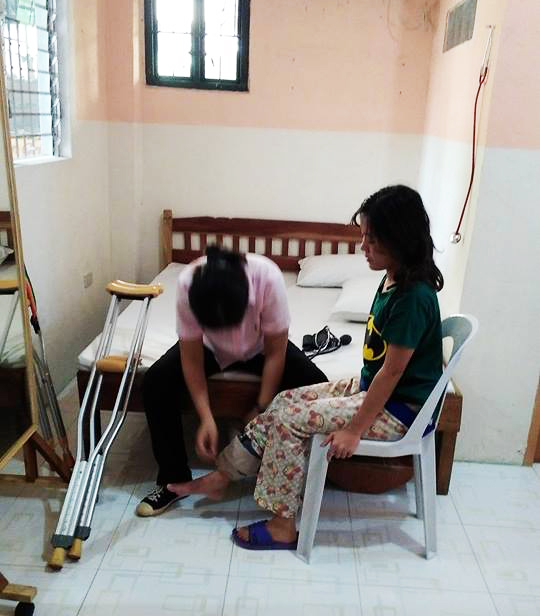
The author undergoing her therapy in the Philippines. She's on her way to
full recovery and will be back in Nepal in August.
Having all those people who cared for me at the time I needed care and support, and who understood me despite everything is very precious to me. I considered this a divine gift.
And most of all, what I have learned from this experience is that being vulnerable didn’t make me feel worthless or less powerful in any way. In fact it deepened my faith and trust in God. It made me feel more loved and I appreciated all the affection I received. In that moment of my perceived weakness I found strength in my relationships with myself, with my family, with my friends and even with strangers.
Spreading Happiness through Sign Language
By Richelle H. Verdeprado
The author, a social worker by profession was, until recently, the Editorial Assistant of MISYONonline.com. She is now teaching full-time at the University of Negros Occidental – Recoletos (UNO-R) in Bacolod City.

Your first glance at this young woman from Cagayan de Oro City named Marice would make you remember her curly hair and smiling eyes. But when you would see her use her hands to communicate with the Deaf you would then remember her as someone whose ears and heart are always embracing the Deaf, especially children. You would think of her as a selfless and dedicated volunteer.
Welcome Home Foundation, Bacolod City
Marice B. Gallares is the fourth of five siblings. Her mother chose the name ‘Marice’ because it is a diminutive of ‘Mary’. Her father died when she was 17. After graduating from college, she took a course in Basic Sign Language offered by the Archdiocese of Cagayan de Oro. She had no idea about Sign Language before that but was excited because she would be traveling to a different town and would stay with other students for six weeks. At that time, the program was being handled by Columban Fr Richard Pankratz. That began her exposure to the work of the Columbans.
Marice likes the charism of the Columbans and she even wished to become a lay missionary. She has many missionary friends and said that she really felt the warm welcome of the Columbans as though she was a part of the family. Marice has never felt out of place with them and she is always fascinated with the simplicity of the lives of the Columbans and their profound commitment to their mission.
At first, Marice found Sign Language to be really difficult. It gave her headaches. It confused her most of the time and even up to now she knows that there is so much to be learned still and that she has to be patient and to persevere. However, after understanding the impact it made on the lives of the Deaf, she started to see Sign Language in a more meaningful way.
It is her interaction with the Deaf and her relationship with them that has made Marice appreciate what she is doing. The Deaf have given her much inspiration to keep on learning so that she can continue getting to know them and be a voice for them too.
That is how she began her life as a volunteer with the Deaf. For six years now she has been an interpreter at Mass every Sunday. The impact it is making may not be that significant for others but for the Deaf and those who love them it means a lot.
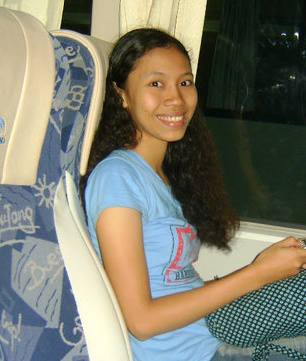
Marice
‘I’m happy with the Deaf. I feel happy to see them happy. And even though there’s no salary, when the children hug me and smile at me and tell me their stories I feel happy. They are always excited to share about their life, both happy and sad stories, and I am thankful to be able to understand them and to know that they understand me,’ Marice said. It made me say that Marice signs to spread happiness to others and to the world.
Marice also volunteers to teach catechism to Deaf children and to prepare them for their First Holy Communion. It requires commitment to volunteer. Even if there is only one deaf person present at Mass there’s still a need for an interpreter to sign. Every deaf person deserves to ‘hear’ God’s word.
When I spoke to her in May this year Marice had just finished a Sign Language summer course run Welcome Home Foundation, Inc, in Bacolod City, and is now back in Cagayan de Oro City. Welcome Home was founded nearly 30 years ago by the late Columban Fr Joseph Coyle.
She is currently a member of the administrative staff in a pre-school in her parish and continues to volunteer as an interpreter at Sunday Mass.
To facilitate the process of bringing God’s word to the Deaf through Sign Language is an important mission that Marice has taken to heart. She just feels that to know how to sign is both a gift and a responsibility.


